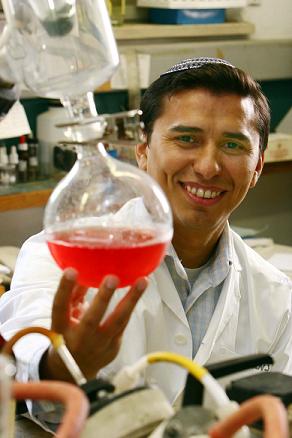Received the Kay Award for Innovative Developments
The Hebrew University

A young researcher from the Hebrew University has developed a method to lower blood pressure using a synthetic compound equivalent to one of the derivatives of the cannabis plant (known as hashish or marijuana). The compound has also been found to have anti-inflammatory properties.
For his research, Yehoshua Maor, a doctoral student in the department of pharmacology at the School of Pharmacy of the Hebrew University, received the Kay Award for Innovative Developments, at a ceremony held as part of the 69th session of the Board of Trustees of the Hebrew University.
Cardiovascular diseases (CVD) cause about one third of deaths in industrialized countries and are a common reason for visiting doctors and taking prescription drugs. However, not all patients respond well to the existing drugs and, in fact, there is currently no perfect drug for the treatment of high blood pressure.
Compounds found so far and extracted from the cannabis plant have been proven to be effective in reducing blood pressure, but they were accompanied by psychotropic activity, that is, activity that affects the brain, which caused, among other things, changes in mood and hallucinations. Previous attempts to separate the brain activity and blood pressure reduction from the compounds present in cannabis (cannabinoids) had only partial success.
Under the guidance of Prof. Raphael Meshulam from the School of Pharmacy of the Hebrew University, Maor succeeded in synthesizing a substance derived from a secondary component of cannabis, cannabigerol, which lacks a psychotropic effect. Laboratory experiments he performed with Prof. Michal Horowitz from the Environmental Physiology Laboratory revealed that the new compound causes a drop in blood pressure in rats that received a low dose of the substance. Further tests also revealed relaxation of the blood vessels. In a study conducted with Prof. (emeritus) Ruth Galili from the Lautenberg Center, it was found that the compound causes an anti-inflammatory response.
Maor, born in Brazil, immigrated to Israel in 1998. He believes that the new compound will enable the development of a new drug with a wide market potential that may also be suitable for patients suffering from chronic inflammatory conditions accompanying high blood pressure.
Maor, who has already won international recognition for his joint work with Gerry Millman, another PhD student in Prof. Meshulam's lab, on the discovery of a new substance in the brain that causes blood vessels to dilate, will begin his post-doctorate at Harvard University Medical School in the fall, where he intends continue his research.
The Kay Awards ceremony has been held every year since 1994. Yitzhak Kay from England, a prominent industrialist in the pharmaceutical industry, founded the practice of awarding awards to encourage university faculty and students to develop innovative methods with commercial potential that will benefit the university and society.
https://www.hayadan.org.il/BuildaGate4/general2/data_card.php?Cat=~~~506534977~~~221&SiteName=hayadan
